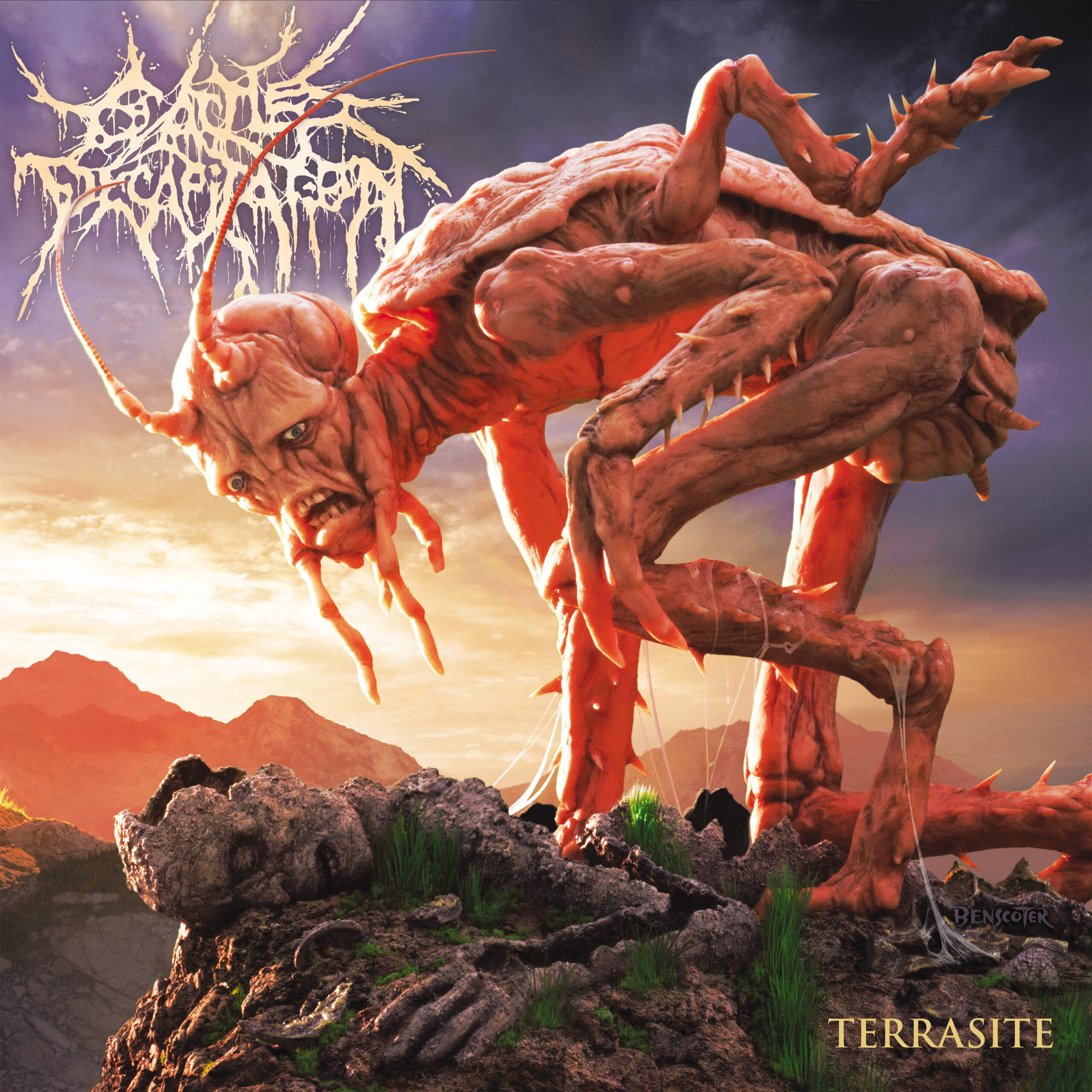
Wes Benscoter
May 11, 2023| Harry Shiels | RELEASE REVIEW

Cattle Decapitation – Terrasite | Album Review
San Diego based extreme metal icons Cattle Decapitation are back, following up 2019’s strangely prophetic portrait of the end times Death Atlas. They look forwards to focus on rebirth; what rises from the ashes of a dead world, the parasitic human hybrid: Terrasite.
Cattle Decapitation have never been a band to sit back on their accomplishments, always forward thinking and refining their sound, they have regularly introduced new elements and fusions into their core of grinding death metal since 2012’s Monolith Of Inhumanity. This culminated in what many consider to be not only the band’s magnum opus, but one of the best extreme metal releases of the past decade, 2019’s Death Atlas. A bleak vision of mankind’s inevitable apocalyptic future, Death Atlas thematically and artistically portrayed a feeling of darkness, ending and finality. Many speculated where the band could go next to follow up such a resounding achievement, but the global pandemic that shortly followed was in many ways an affirmation of the band’s misanthropy, lending fresh inspiration to view their acrimonious displeasure of humankind’s ‘rebirth’ in a new light.
This brings us to Terrasite, the title itself being a word conceptualised by vocalist Travis Ryan, derived from Latin and Greek to mean ‘Earth-eater’ as a metaphor for humanity’s role in the further destruction of the planet. Where Death Atlas revelled in the darkness and finality of global extinction, Terrasite conceptually explores the rebirthing of humanity’s persistent and parasitic propensity for selfishness, to never learn from mistakes and continue to consume and destroy in the name of so-called survival even in the face of global collapse.
From the beginning of album opener ‘Terrasitic Adaption’, Cattle Decapitation make it clear that the broader thematic elements of the album’s concept are woven throughout the songwriting itself. Atmospheric samples of percussive bells are blended with inhuman cries and screams as if this is the moment of the Terrasite’s emergence from the earth, punctuated with deliberate, anticipatory riffs and drum beats, as well as atmospheric lead guitar melodies before detonating into the exact level of ferocity you’d expect. These small conceptual motifs are found all across Terrasite, whether its moments like in second single ‘Scourge of the Offspring’ where the instrumentals sound like scurrying armies of insects as the lyrics compare humanity to a swarm of flies, or the lead guitar melody in ‘The Storm Upstairs’ almost emulating the sound of a storm alert siren before a merciless instrumental kicks in as if the storm itself has arrived.
Even in a broader sense this stays true, such as with ‘Solastalgia’. The name of the track meaning the distress that is produced by environmental change, the song is packed with melodic death metal energy, feeling incredibly emotive and filled with a sense of longing, which compliments the lyrical themes of the song itself. The lyrical content, songwriting and performances are married to the conceptual themes in one way or another across the board. All of the classic Cattle Decapitation hallmarks are present, but Terrasite feels different to anything that has come before. Whilst tracks like the lead single ‘We Eat Our Young’ and the excellent ‘A Photic Doom’ are absolutely unyielding in their barbarity; others such as ‘Dead End Residents’ revel in toying with expectations, fluctuating between lighter and more aggressive textures.
Travis Ryan’s vocal styles are even more varied this time around, the piercing screams and guttural low growls, further employment of the almost clean screeching. A lot of times these vocal styles are layered, leading to performances like ‘The Insignficants’ feeling unhinged and inhuman. This is as well as some actual clean sung and spoken word passages, heavily featured within highly melodic and emotional album closer ‘Just Another Body’, that are reminiscent of Type O Negative vocalist Peter Steele. The drumming of David McGraw continues to impress album after album, with some absolutely jaw-dropping precision and speed present throughout Terrasite, in particular on the track ‘…And the World Will Go On Without You’. Olivier Pinard’s bass work is a real standout, maintaining a significantly stronger presence than previous efforts and having a number of moments to shine in the mix. This is particularly noticeable on ‘The Storm Upstairs’ with both a gnarly distorted tone on a call and response hook with the guitars, or the slightly softer warmth of the bass as it takes the melodic lead later in the more ambient bridge passages of the track.
“All of the classic Cattle Decapitation hallmarks are present, but Terrasite feels different to anything that has come before.”
As well as pulling more even more technical death metal and melodic death metal elements into the songwriting, the band continued to explore the more ambient and atmospheric textural elements they experimented with on Death Atlas, but in a more cohesive way. Gone are the deliberate dark ambience of the interludes spaced throughout the track listing, choosing instead to have each track playing with a varying range of dynamics, textures, tempos and intensities. This is helped by further exploring the merits of being a five-piece outfit, with this being only the second album to feature a dedicated rhythm guitarist in the form of Belisario Dimuzio. This allows Josh Elmore to really explore a wide range of lead guitar styles and tones, whether that is in the sense of more melodic and atmospheric lead guitar passages, or more overt distorted shredding on guitar solos and lead harmonies. All of this is once again complimented by the outstanding production, mixing and mastering of David Otero, who at this point knows how to bring the absolute best out of the band as he has been working with them since 2012’s Monolith of Inhumanity.
Album closer, ‘Just Another Body’, is a highly emotional ten-minute epic that truly feels like new territory for the band. Written in the aftermath of passing of both Cattle Decapitation founding member Gabe Serbian and The Black Dahlia Murder frontman Trevor Strnad, there is a dark cloud permeating the song. Featuring a synthesised piano and strings throughout the soundscape of the track, for the most part this stays as a highly emotional mid-paced song, more heavy in the sense of an emotional atmosphere as opposed to musical intensity. Whilst the traditional fast-paced deathgrind does take over at times across the ten-minutes, it’s weaved between more deliberate and mid-paced moments and bookended by extended emotional, melodic passages for an incredibly dark and moving ending to the album.
Terrasite is the sound of the further maturation of Cattle Decapitation, having been actively creating music for the better part of twenty-five years, their continued experimentation and refusal to stagnate on a singular style is impressive and highly commendable. Whilst still retaining their corner-stone of stark intensity and misanthropic lyrical themes, they manage to craft extreme musical experiences packed with emotion, subtleties and progressive sensibilities. This is an apt follow up to Death Atlas as it truly feels like the dawn of a new era for the band to continue to capitalise on their well-deserved legend’s status and ever blossoming popularity. If you’ve been a fan of any of their releases, especially from the past decade, then Terrasite is well worth your time and if you’re new to Cattle Decapitation then this is an excellent jumping off point.



